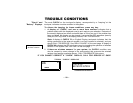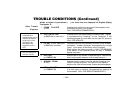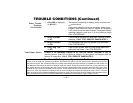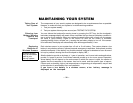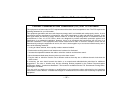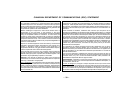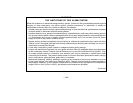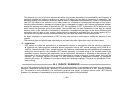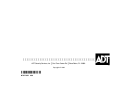
Ð 41 Ð
WARNING!
THE LIMITATIONS OF THIS ALARM SYSTEM
(continued)
¥ Alarm warning devices such as sirens, bells or horns may not alert people or wake up sleepers if they are
located on the other side of closed or partly open doors. If warning devices sound on a different level of
the residence from the bedrooms, then they are less likely to waken or alert people inside the
bedrooms. Even persons who are awake may not hear the warning if the alarm is muffled from a stereo,
radio, air conditioner or other appliance, or by passing traffic. Finally, alarm warning devices, however
loud, may not warn hearing-impaired people or waken deep sleepers.
¥ Telephone lines needed to transmit alarm signals from a premises to a central monitoring station may be
out of service or temporarily out of service. Telephone lines are also subject to compromise by
sophisticated intruders.
¥ Even if the system responds to the emergency as intended, however, occupants may have insufficient
time to protect themselves from the emergency situation. In the case of a monitored alarm system,
authorities may not respond appropriately.
¥ This equipment, like other electrical devices, is subject to component failure. Even though this
equipment is designed to last as long as 10 years, the electronic components could fail at any time.
The most common cause of an alarm system not functioning when an intrusion or fire occurs is inadequate
maintenance. This alarm system should be tested weekly to make sure all sensors and transmitters are
working properly.
Installing an alarm system may make one eligible for lower insurance rates, but an alarm system is not a
substitute for insurance. Homeowners, property owners and renters should continue to act prudently in
protecting themselves and continue to insure their lives and property.
We continue to develop new and improved protection devices. Users of alarm systems owe it to
themselves and their loved ones to learn about these developments.



